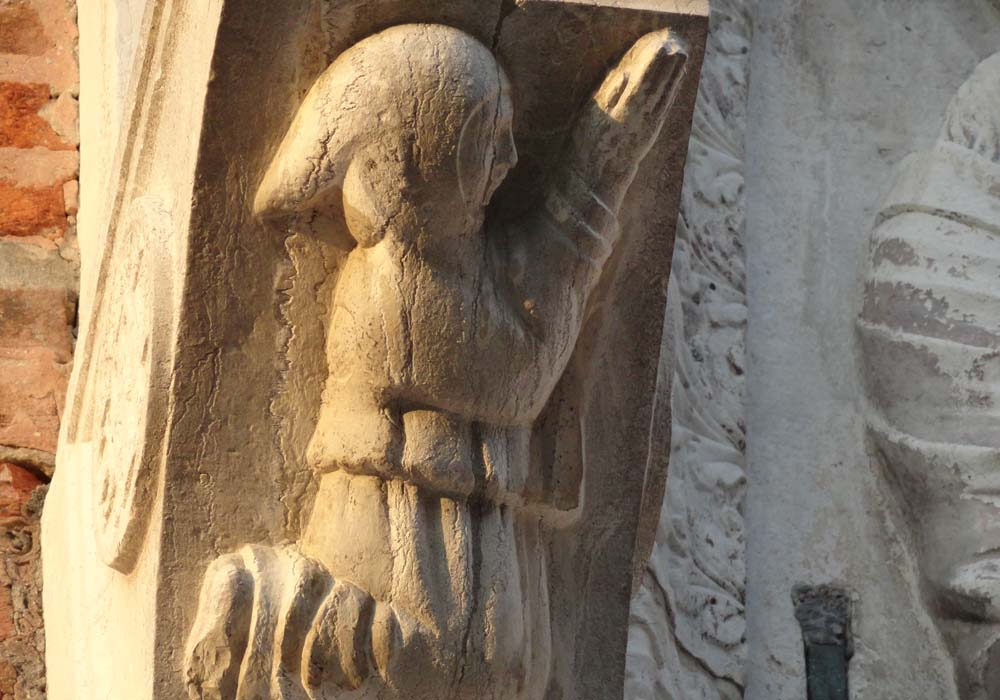On Sigismondo’s Side
As a child growing up in Glasgow, my experience of theatre was confined to the yearly pantomime at Christmas. The whole family attended. A Highland scene, with tartan costumes on stage and, if we were lucky, an entire pipe band entering from the foyer and marching up the aisles, was an unfailing component. The principal male role was irritatingly taken by a female, a “breeches role” like Cherubino in Mozart’s Marriage of Figaro, or the contralto hero/heroines in serious operas by Rossini such as La donna del lago or Bianca e Falliero. Who can tell by what strange process the practice had been passed on to the world of pantomime?
One of my earliest, still powerful erotic memories is connected to the masked man, no doubt a prince in exile, who discovers the abandoned children under a tree in Babes in the Wood. I had been primed by the cowboy on horseback in the television series The Lone Ranger, always introduced by fast music from the overture to William Tell and invariably accompanied by his faithful Indian follower, Tonto. If no one speculated about what the two of them got up to after they had bedded down for the night, perhaps that is just as well.
Theatrical experiences of a more conventional nature were limited till I moved to Budapest in 2005, after which I had occasion to experience a living, uncomplicated theatrical culture. Audiences of all ages were in the habit of seeing shows every couple of weeks during the season. Even on Monday nights the capital’s theatres were often full. Hungarian audiences approached the experience with an easy naturalness I never found in Scotland, possibly because, unlike in Calvinist Edinburgh of the seventeenth and early eighteenth century, theatre had never been outlawed in their country, or banned by the ecclesiastical authorities. While still at school, I attended a production of John Webster’s The Duchess of Malfi at Glasgow’s Citizens Theatre which shocked me to the core with the violence of its action and its ruthlessly explicit, cruel language. That counts among a series of plays from the fallow years before Budapest which stand out in retrospect. Another was a production of Pedro Calderón de la Barca’s La vida es sueño which the Stary Teatr of Cracow brought to Edinburgh’s King’s Theatre during the 1988 festival.
An uncanny instinct steers us in the direction of books, paintings, places and pieces of music which are destined to fulfil a revelatory, emblematic function in our lives, without any rational explanation being available as to how we pick them out. The phenomenon is similar, but not identical, to what happens when a remark let drop with seeming casualness, or one we overhear, refuses to “go away”, even though its meaning appears straightforward and it has no conceivable basis for haunting us. It is as if we sensed that here lies an issue which pertains to us at the most profound and intimate level. A key has been delivered into our hands which we will cast aside at our peril. If we do not take the opportunity to unlock the door in question and face whatever lies beyond, we may well find we ourselves pushed across that threshold when we least expect it, under considerably less propitious circumstances.
I had that feeling about Calderón’s drama, which explains why I bought a ticket. I went alone, often the ideal condition for connecting with a play or a piece of music. You do not have to worry whether the person sitting next to you is enjoying themselves or not. Nor do you have to engage in superficial conversation during the intervals, or put up with uninsightful, unsympathetic commentaries, as they tell you how disappointed they have been with a spectacle which you find utterly moving and captivating.
Everything that evening was in Polish. We all wore headphones through which a voice, always the same, not varying for character or situation, conveyed the English meaning of what was being said. Somehow that did not detract from the power of the production. It reminds me of attending Prokofiev’s The Fiery Angel, in a stunning mise-en-scène directed by Mariusz Trelinski for the Teatr Wielki in Warsaw earlier this year. The contralto singing Renata, whose role is the axis the whole opera revolves around, had lost her voice. While this woman acted and mouthed the words, a singer specially flown in from Moscow sang her role from the side of the stage. The effect of the estrangement was to heighten the impact of the production rather than weakening it.
In a gesture towards Ariosto, at the very start of Calderón’s play Rosaura and her accompanying “gracioso” Clarín, the rough equivalent of the Clown in Shakespeare’s dramas, tumble off the back of a hippogriff amidst mountains in Poland. Mountains? In Poland? Well, in the end they are no more improbable than a sea coast in Bohemia. In this production, Rosaura, cross-dressing as a man and wearing a broad-brimmed hat, advanced with her companion from the back of the auditorium, then clambered up onto the stage. Immediately we were all agog. Riveted, without the actors needing even to pronounce a word. What on earth was going on? And what could be about to happen?
The backbone of Calderón’s drama is the common enough folklore motif of the “king for a day”. When the court astrologer foretells that the son of king Basilio will rise up against him and dethrone him, he decides to have the boy reared amidst wild beasts in a tower amongst the mountains. When the boy is an adult, suffering an attack of contrition, the king has him drugged. Sigismondo awakes in the royal palace, where he is treated like a king and behaves like a beast. He attempts to rape a woman and murders a courtier by throwing him from a window.

The next morning, he reawakens in the tower. Basilio’s subjects, however, rise up against him and their leaders arrive to proclaim Sigismondo the new king. Convinced this must be another dream from which he will inevitably awaken, Sigismondo eventually decides that he “may as well” behave properly. (‘Let me embrace you,’ he tells the man who was his gaoler. ‘What are you saying?’/ ‘That I am dreaming, and that I want/ to act well, as even in dreams/ acting well is not without effect.’) Acting honourably is a free choice which Sigismondo reaches under conditions of total ontological uncertainty.
Several moments remain impressed upon my memory. The very first man I had a serious relationship with was an accomplished astrologer who lost no time in casting my natal chart and discussing its implications with me as we lay in bed. I was riveted by the point – which I have never located in the Spanish text – where Basilio is made to kneel, and a sword is placed in his son’s hand, so that he can strike his father. Sigismondo looks up and says: ‘Now the stars must wait and see what I decide to do.’
Rosaura, who first meets Sigismondo while she is in male attire and he chained up, encounters him again at court where, as a woman, she is seeking reparation from the man who should have become her husband. She astonished me with a speech where alternate sentences begin: ‘As a man, I request you to… But as a woman, I want you to…’ The effect of cross-dressing in the theatre of Calderón, where women’s roles were given to real, flesh and blood women, is quite distinct from in Shakespeare’s plays, where they were given to boys whose voices had not broken.
Probably I loved most of all the scene during Sigismondo’s first day as a king when he confronts his father, and is able to tell the man how much he loathes and detests him due to the unjust treatment he has received. (‘I am afraid to hug you.’ ‘I’ll get by perfectly well without that/ as I have done until now;/ seeing my father treats me/ with such savagery,/ banishing me from his side/ in demeaning circumstances,/ rearing me like a beast,/ handling me like a monster/ and planning my death,/ it matters little/ that he didn’t hug me,/ if he doesn’t see me as being human.’) How I would have loved to get the opportunity, to summon up the courage needed to lambast my own father for what he did, in exactly the same way!
My own family consistently gave me the impression that I had no right to be there. No right to a life or an identity. It was as if had to beg their forgiveness for getting born, with all the trouble and inconvenience that had brought them. So the words which Rosaura overhears, in Sigismondo’s first soliloquy, rang powerfully for me: ‘Heavens, I want to find out/ given your treatment of me,/ what crime I committed/ against you by being born;/ yet I realise that, getting born/ was itself a crime;/ your justice and severity/ had sufficient grounds/ since the greatest crime somebody can/ commit is, being born.’
More than fifteen years later, I attended another production of the same play at another Edinburgh festival, this time in the excellent English translation by my dear friend Jo Clifford. Sigismondo’s total disorientation reduced me to tears that evening. Nothing that is happening around him makes sense. He cannot trust what he sees because in all likelihood it is a dream. In the same way, I could make no sense of behaviours in my family, nor could I trust my own perceptions, because I believed the other family members must be sane, while I was mad: ‘Heavens, if I really am dreaming,/ cut my memory off,/ as there cannot possibly be room/ for so many things in a dream’. And again: ‘My soul, let us dream, let us dream/ another time; but remaining/ attentive, and aware/ that when the time arrives/ we must awaken from this illusion;/ keeping that in mind,/ the shock will be less/ since taking precautions/ can make a fool of harm.’
What I saw onstage was my own ontological confusion as a teenager at St Aloysius, forced to draw ongoing conclusions about how the world operated and how I myself should behave in a situation where no one could be trusted, I had nobody to turn to, and where what I saw around me made no sense. Representation brings relief. Seeing my predicament of so many years before acted out onstage, a predicament which made me the person I was, meant I was no longer alone with it. Several hundred spectators all around me were sharing Sigismondo’s dilemma. Any grounds for shame had vanished.



